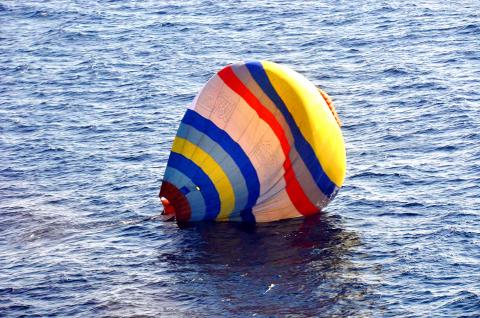The Coast Guard Administration (CGA) yesterday said that it had tried to rescue a Chinese hot-air balloonist who crashed into the ocean during an attempt to land on the contested Diaoyutai Islands (釣魚台) on Wednesday before he was picked up by the Japan Coast Guard.
According to a report by Japanese public broadcaster NHK, the Japan Coast Guard was informed by its Taiwanese counterpart of the man’s distress call.
The NHK report said that the Chinese man, later identified as Xu Shuaijun (許帥軍), 35, told Japan Coast Guard personnel that he left China alone to fly to the islands, which Japan claims and calls the Senkakus, and which are also claimed by Taiwan and China.

Photo: AFP / JAPAN COAST GUARD
Although Xu was rescued by the Japanese first, Ministry of Foreign Affairs spokesperson Anna Kao (高安) yesterday reiterated that the Diaoyutais are the territory of the Republic of China, adding that the concerned parties cooperated in rescue efforts out of humanitarian concerns.
CGA Secretariat Director Hsieh Ching-chin (謝慶欽) said that upon receiving information from National Rescue Command Center, the Coast Guard Administration dispatched the 800 tonne-class Mou Hsing to search for the balloonist.
Taiwanese fishing ships operating in waters surrounding the area were also told by the Fisheries Agency to help locate the missing man, Hsieh said.
The National Rescue Command Center reported that the balloon crashed into the ocean about 17 nautical miles (31.5km) off the south of the Diaoyutais at 2:26pm on Wednesday, Hsieh said.
The Mou Hsing returned to normal patrol duties when the CGA received information from the Japan Coast Guard that the man was rescued at about 3pm about 18 nautical miles off the south of the islands, Hsieh said.
A Japanese patrol ship rescued Xu and handed him over to a Chinese patrol ship on Wednesday night after negotiations through diplomatic channels, the NHK reported.
Beijing declined to acknowledge any Japanese role in his rescue.
Chinese Ministry of Foreign Affairs spokesman Qin Gang (秦剛) told reporters only that a “Chinese coast guard vessel patrolling in waters of the Diaoyu Islands (釣魚群島) learned that one Chinese balloonist fell into the water.”
“The coast guard vessel came to the waters where the accident took place to help the balloonist and the relevant person has been rescued and transferred to the Chinese side,” he said at a regular briefing in Beijing.
The man was drifting inside Japanese territorial waters when he was picked up, the NHK reported.
Xu took off from China’s Fujian Province on Wednesday morning, a Japan Coast Guard official said.
It was an ambitious goal — hot-air balloons travel largely at the mercy of the wind, and the Diaoyutais are tiny specks in the East China Sea, 359km from his take-off point.
Xu sent a request for help several hours into his flight and ditched in the sea.
Xu, a cook, last year became the first man to pilot a hot-air balloon over northeast China’s Bohai Bay.
On his verified account on a Chinese microblogging site, Xu posted a short message declaring that he had been returned safely to Fuqing in China’s Fujian Province.
“I have returned safely,” Xu wrote. “Thanks everyone for your concern.”
His supporters wrote back with words of support, with many declaring him a “hero” who had done well even if he had fallen short of his target.
Xu did not post any further details on his voyage and did not immediately respond to a request for comment, but in two microblog postings in September last year, he excitedly made note of his plans.
In one he shared a photograph of a red Chinese flag with islands in the background.

MORE VISITORS: The Tourism Administration said that it is seeing positive prospects in its efforts to expand the tourism market in North America and Europe Taiwan has been ranked as the cheapest place in the world to travel to this year, based on a list recommended by NerdWallet. The San Francisco-based personal finance company said that Taiwan topped the list of 16 nations it chose for budget travelers because US tourists do not need visas and travelers can easily have a good meal for less than US$10. A bus ride in Taipei costs just under US$0.50, while subway rides start at US$0.60, the firm said, adding that public transportation in Taiwan is easy to navigate. The firm also called Taiwan a “food lover’s paradise,” citing inexpensive breakfast stalls

US PUBLICATION: The results indicated a change in attitude after a 2023 survey showed 55 percent supported full-scale war to achieve unification, the report said More than half of Chinese were against the use of force to unify with Taiwan under any circumstances, a survey conducted by the Atlanta, Georgia-based Carter Center and Emory University found. The survey results, which were released on Wednesday in a report titled “Sovereignty, Security, & US-China Relations: Chinese Public Opinion,” showed that 55.1 percent of respondents agreed or somewhat agreed that “the Taiwan problem should not be resolved using force under any circumstances,” while 24.5 percent “strongly” or “somewhat” disagreed with the statement. The results indicated a change in attitude after a survey published in “Assessing Public Support for (Non)Peaceful Unification

The CIA has a message for Chinese government officials worried about their place in Chinese President Xi Jinping’s (習近平) government: Come work with us. The agency released two Mandarin-language videos on social media on Thursday inviting disgruntled officials to contact the CIA. The recruitment videos posted on YouTube and X racked up more than 5 million views combined in their first day. The outreach comes as CIA Director John Ratcliffe has vowed to boost the agency’s use of intelligence from human sources and its focus on China, which has recently targeted US officials with its own espionage operations. The videos are “aimed at

Four former Hong Kong opposition lawmakers jailed in the territory’s largest national security case were released yesterday after more than four years in prison, the first among dozens convicted last year to regain their freedom. Former legislators Claudia Mo (毛孟靜), Jeremy Tam (譚文豪), Kwok Ka-ki (郭家麒) and Gary Fan (范國威) were part of a group of 47 public figures — including some of Hong Kong’s best-known democracy advocates — who were charged with subversion in 2021 for holding an informal primary election. The case fell under a National Security Law imposed on the territory by Beijng, and drew international condemnation and warnings